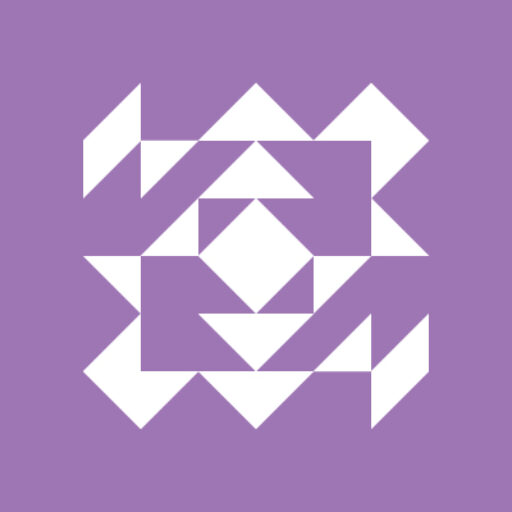In-depth descriptions of the Alpaca Festival workshop programme in Sheffield. Tickets are limited, pre-booking required.
Several of the workshop leaders are also giving background talks as part of our free conference programme.
Table of contents
- Patterns for textile repair
- Making a paper record
- Procedural drawing
- Pen-Plotting Plumage Patterns
- Kumihimo braids
- Live coding computer graphics
- 33 Fingering Methods for Qin
- Musical improvisation with patterns
- Learning to juggle with mathematics
10am Saturday, 13th September
There are three workshops running from 10:00am on the 13th September, each for around two hours until midday. Please note that they will run at the same time, and so you will only be able to attend one of them.
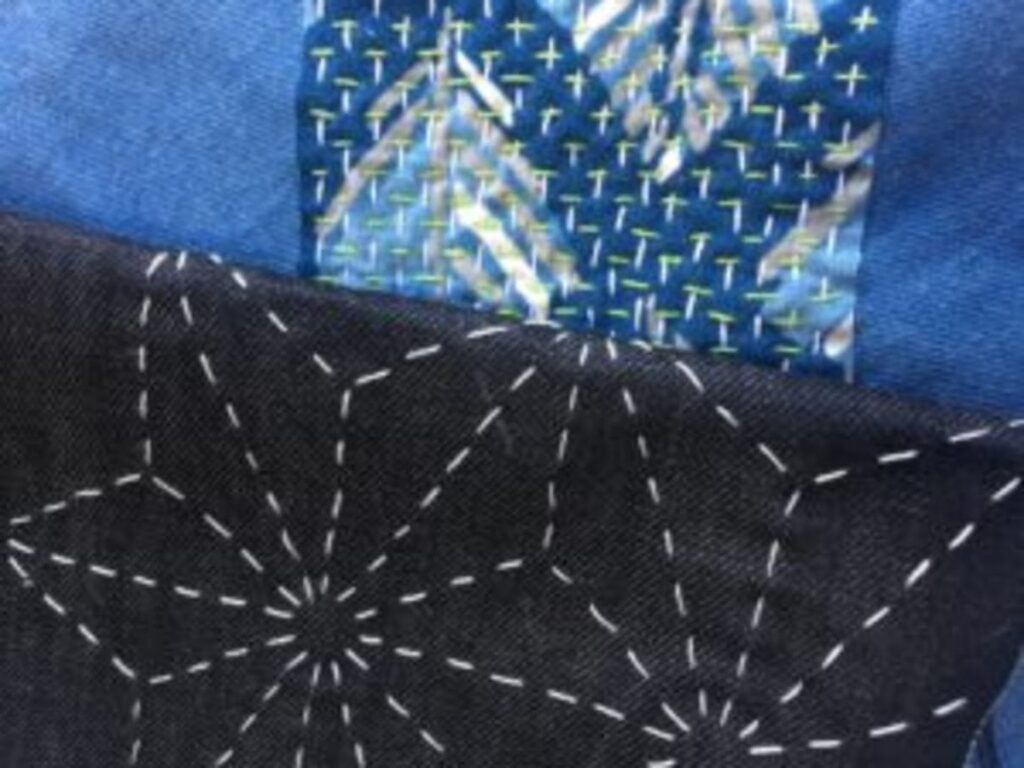
Patterns for textile repair
CADS, Arley St, Highfield, Sheffield S2 4QP
10am-midday, Saturday 13th September
Tickets: Sold out
Led by artist and researcher Lucie Hernandez, this hands-on workshop is designed to introduce people to the possibilities of using algorithmic design to generate stitch patterns, based on Japanese Sashiko techniques. This method of stitching inspires people to care and value their clothes and can be performed as part of a clothes repair practice. It is valued for its unique ability to reinforce damaged areas on garments by adding visible, decorative elements.
The workshop is intended for people interested in developing a more sustainable approach to fashion and in imagining ways that technology can be integrated into a clothes repair process. During the workshop participants will play with a prototype pattern generating tool to customise and construct patterns to encourage creative engagement. The session will be a chance to explore the stitching process and access materials to stitch a sample pattern to create a repair patch. All materials will be provided, but we encourage you to bring your own fabric scraps and remnants for the patch.
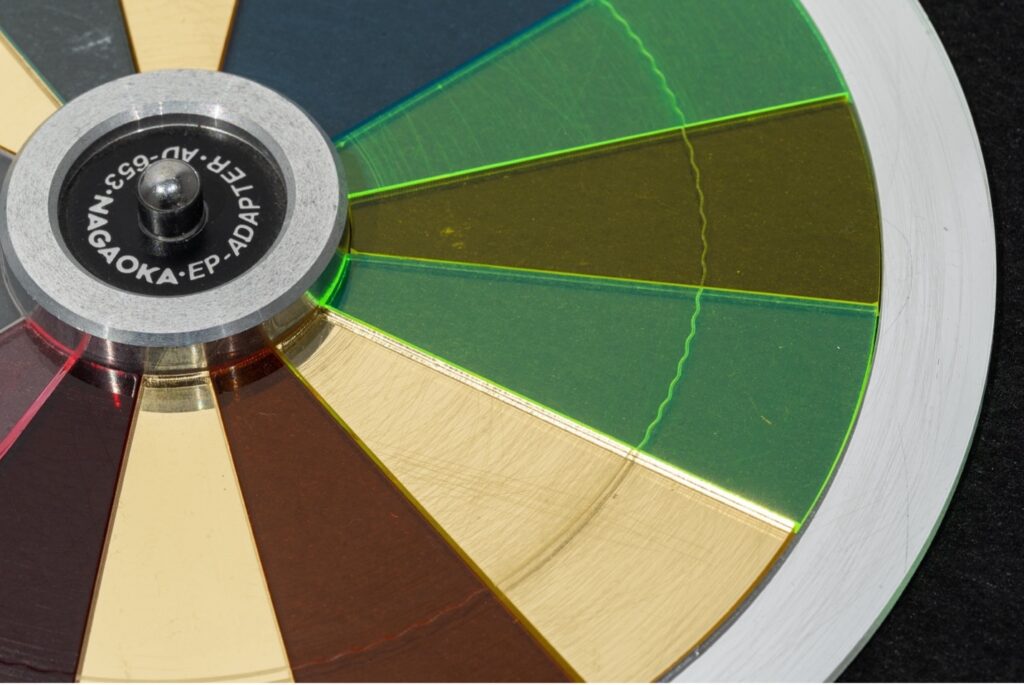
Making a paper record
CADS, Arley St, Highfield, Sheffield S2 4QP
10am-midday, Saturday 13th September
Tickets £8-£15
Through this workshop lead by researcher and artist JO Kazuhiro visiting from Japan, each participant will make a paper record using their hands and minds as well as their machines. Each result will be engraved and played on a record player by them. The workshop will consist of a historical review of records including the making of a paper record, in conjunction with a related talk and performance also presented at Alpaca Festival.
“I have suggested to change the gramophone from a reproductive instrument to a productive one, so that on a record without prior acoustic information, the acoustic phenomenon itself originates by engraving the necessary Ritchriftreihen (etched grooves).” – László Moholy-Nagy (1923)
With the above inspiration , instead of using a conventional music recording, we computationally draw a waveform with a vector graphics application (e.g., Inkscape or Adobe Illustrator) by calculating the frequency of each note in a piece of music. The waveform is then engraved horizontally onto paper using a portable cutting plotter. A feature of the work is the lack of original sounds (the outcome is not a literal record or vinyl), yet it sounds like bass and rhythm from an analog synthesizer.
Participants are encouraged to bring their own PC or Mac with Inkscape (https://inkscape.org/) or Adobe Illustrator pre-installed.
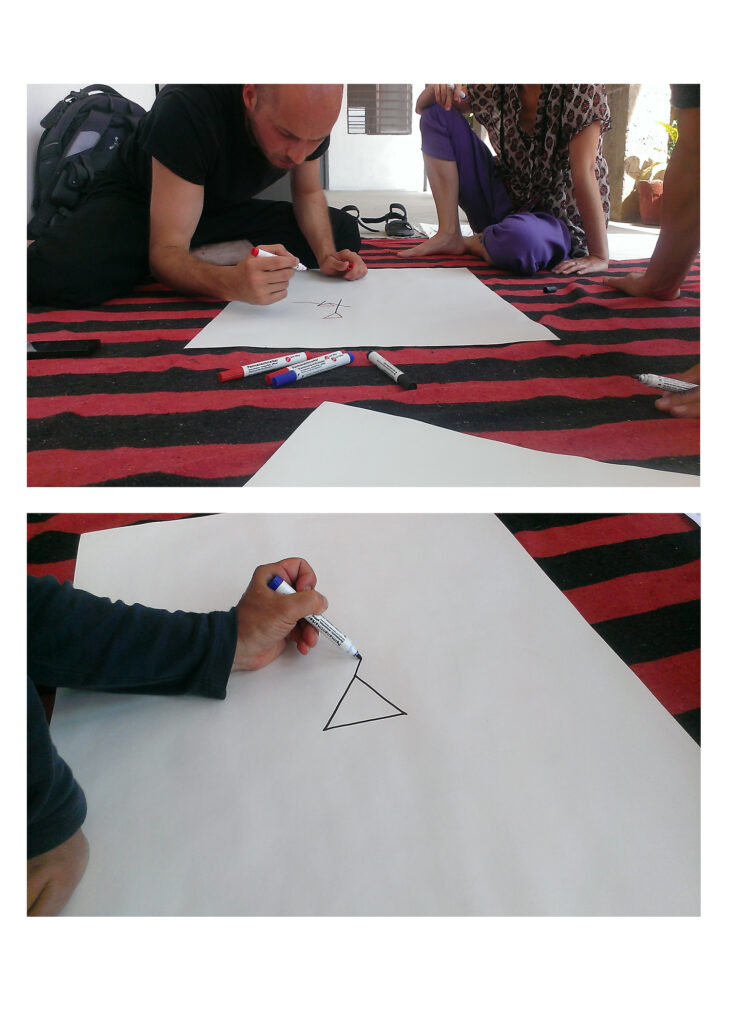
Procedural drawing workshop
CADS, Arley St, Highfield, Sheffield S2 4QP
10am-midday, Saturday 13th September
Tickets: Sold out
In this hands-on workshop lead by artist and designer Agoston Nagy visiting from Hungary, participants will compose and draw algorithmic shapes, patterns, and generative systems using flip chart markers on large sheets of papers in a collaborative environment. We will not rely on any computers, we use only pens, lines, papers, logic, repetition, rules, process. We are following the path that many philosophers, engineers, inventors, mystics have followed before us: think and draw. During the session, we will focus on process, which involves a continuous cognitive effort from the makers: presence, combined with some kind of openness and patience towards the rules and each others while applying the pre-scripted rules.
We’ll explore various methodologies, including those of Paul Klee, the renowned Bauhaus artist, whose Pedagogical Sketchbook presents a compelling theory on the “language of lines.” These ideas closely align with Gestalt principles, which explore how human perception and cognition relate to visual forms. We’ll also explore the difference between deterministic and probabilistic systems, drawing on the ideas of Allison Parrish, who describes programming as “organized forgetting” — a way of foregrounding imperfections, nuance, and context in artistic practice.
After a brief introduction to the key concepts, we’ll begin drawing together, starting with simple rule-based exercises inspired by classic examples of instruction-based art. Participants will receive pre-written instruction sets and rule sheets designed to highlight the creative potential within constraints and limitations. From there, we’ll move on to creating our own rules.
Saturday evening, 13th September
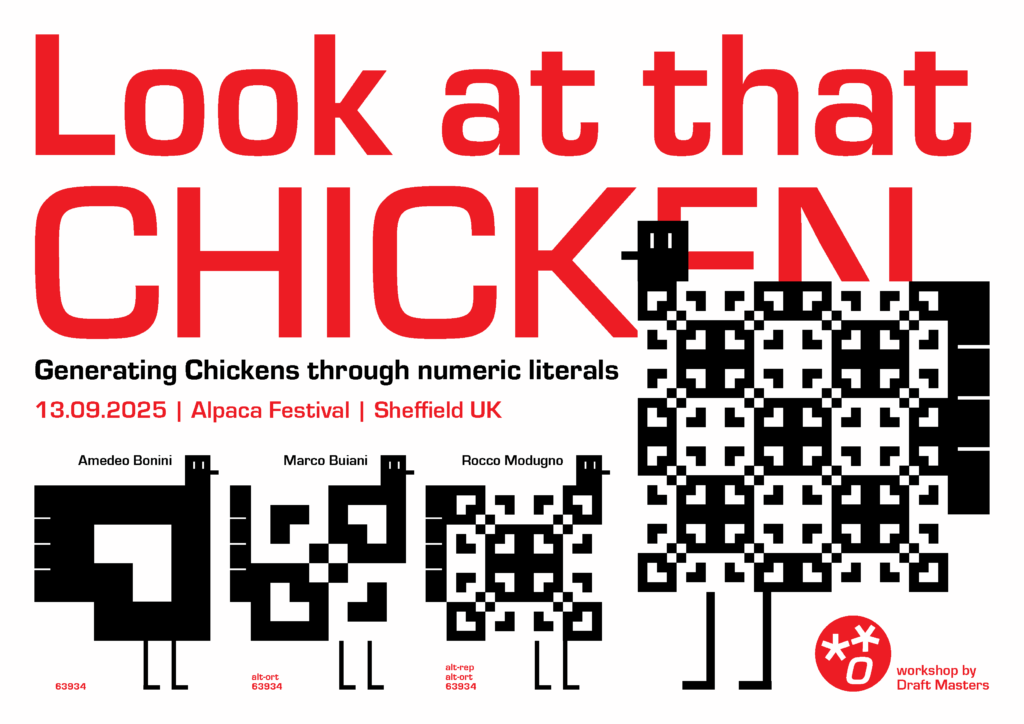
The following will be a drop-in workshop as part of the club night.
Look at that chicken! – Pen-Plotting Plumage Patterns
“Look at that chicken” is a drop-in workshop lead by Draft Masters, aka Rocco Lorenzo Modugno, Amedeo Bonini and Marco Buiani visiting from Italy. Participants will draw chickens and customize their plumage with generative patterns inspired by the workshop leaders’ own decorative theory. Using a rough interface, anyone will be able to design their own patterned chicken and print it live on a postcard. There will be a guided exploration, but free exploration is encouraged. Plotted chickens will be given to participants or displayed in the space, generating a henhouse. No experience or registration needed—anyone can just come, play, and plot a chicken!
11am Sunday, 14th September
There are two workshops running from 11:00am, each for around two hours until 1pm. Please note that they will run at the same time, and so you will only be able to attend one of them.
Kumihimo Braids Using Simple Tools
CADS, Arley St, Highfield, Sheffield S2 4QP
11am-1pm, Sunday 14th September
Tickets £8-£15
This workshop lead by makers Jackie Pease and Jake Thorne will open with a short talk describing a few simple methods for making patterned cord bracelets by hand:
- kumihimo using discs or a marudai loom
- lucet braiding
- fingerloop braiding
Jackie and Jake will describe how they made simple tools for each of these at their community makerspace DoES Liverpool, talking about how patterns can surprise the maker as they emerge from simple abstract constraints. They will show some example looms and devices that can be easily reproduced using found materials and makerspace equipment.
Moving on to the practical part of the workshop, they will concentrate on kumihimo braiding to make a bracelet. Participants will be invited to use a computer program or ‘paper computer’ (provided) to select an algorithm to follow, based on their preferences. The workshop will wrap up by sharing work and considering the impact of choices that have been made or could be made in future experimentation.
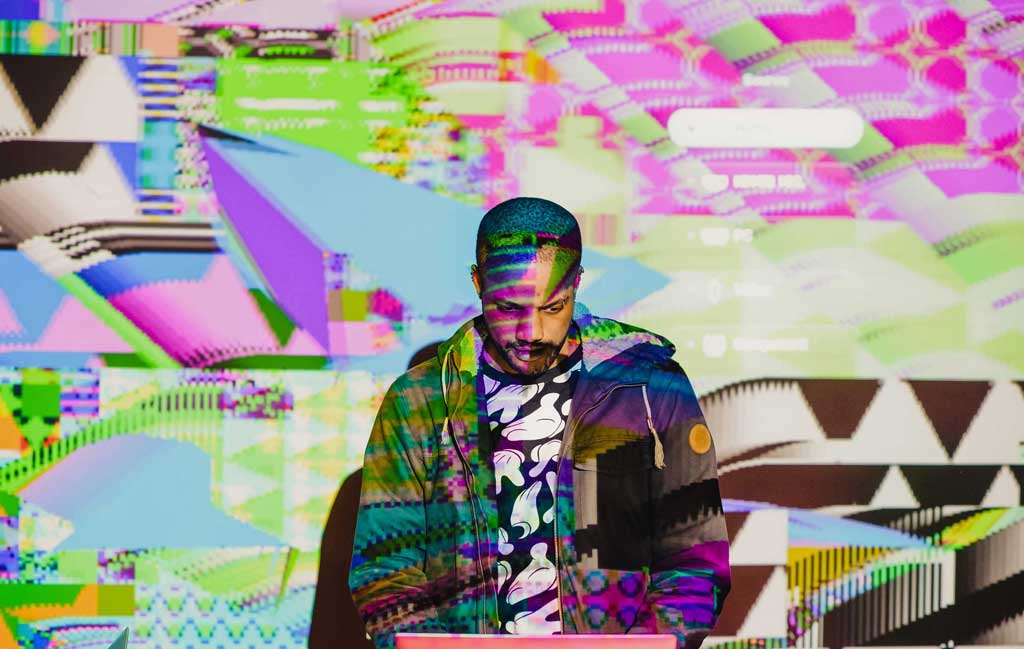
Live Coding Visuals with Hydra
CADS, Arley St, Highfield, Sheffield S2 4QP
11am-1pm, Sunday 14th September
Tickets: Sold out
This beginner-friendly workshop lead by artist, musician and curator Antonio Roberts (aka hellocatfood) will introduce you to the basics of the free Hydra software for creating live video graphics. Antonio will focus on how image sources (oscillators, shapes, cameras, windows) can be transformed, modulated, and composited by chaining together different functions.
Hydra is a platform for live coding visuals, inspired by analogue modular synthesis. It is built in the javascript programming language by Olivia Jack and be extended through the use of custom image textures, videos and webcam inputs. Hydra may be accessed for free at https://hydra.ojack.xyz (warning: features stroboscopic and other strange visual effects).
This workshop will also introduce you to the world of live coding, where artists and musicians create performances through code. We will delve into the history of live coding and the many approaches for creating audio visual performances.
By the end of the workshop you will have learnt the skills needed to perform using Hydra. No prior coding experience is necessary. Participants will need to bring their own laptop.
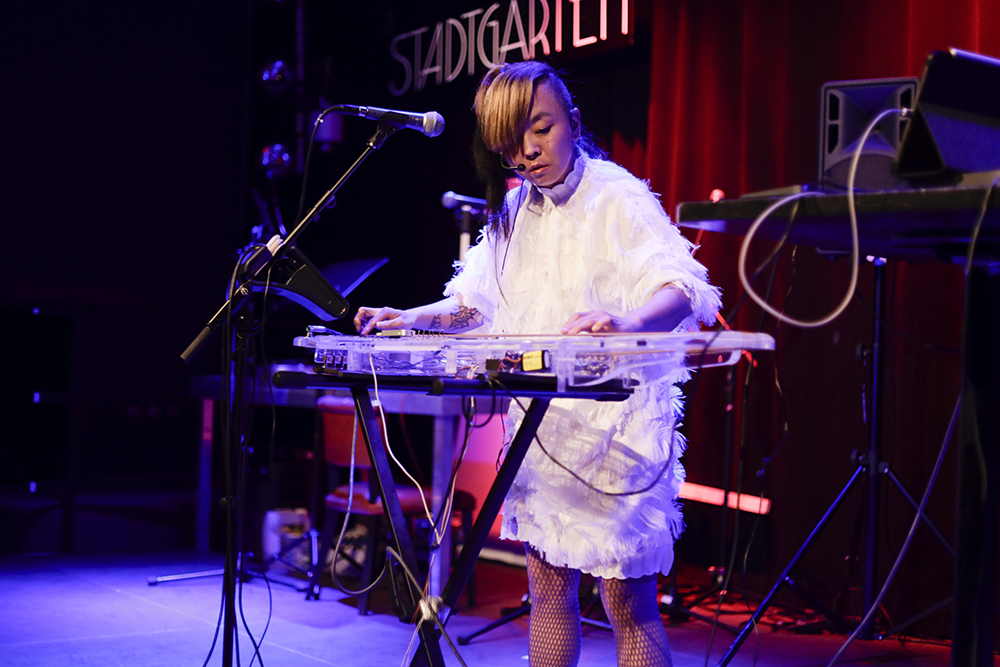
33 Fingering Methods for Qin
CADS, Arley St, Highfield, Sheffield S2 4QP
11am-1pm, Sunday 14th September
Tickets free, pre-booking required
This workshop/performance lead by Berlin-based artist Echo Ho explores the 33 hand posture charts from the Ming dynasty’s Qin (Chinese classical seven-stringed instrument) handbook, Taiyin Daquanji, transforming ancient Chinese musical notation into participatory pattern-making.
Drawing on historical fingering methods that connect human gestures with cosmic phenomena—such as cranes dancing in the wind, dragons emerging from pools, and cicadas singing in autumn—participants will collectively learn and embody these notation systems. These embodied patterns will serve as the basis for collective improvisation, where participants create interwoven sonic and gestural textures using their voices, body movements, and simple electronic instruments. Real-time visual projections of the original charts, overlaid with participant movements, will create a dialogue between historical notation and contemporary interpretation. The ancient classification system, which links specific fingers to celestial elements (sun, moon, heaven, earth) and natural forces (wind, mountain, river, cloud), provides a framework for structured improvisation, as an ongoing process of negotiation between multiple agencies—human and non-human, material and conceptual, past and future.
The session will culminate in all 33 fingering methods being activated simultaneously by different individuals, creating a living model of the cosmological system embedded in qin practice—where human gesture, natural phenomenon, and musical pattern become indistinguishable. This collective re-worlding demonstrates how ancient notation systems can function as technologies for creating new realities rather than merely preserving old ones. It suggests that the difficulty of modelling relationships isn’t a problem to be solved, but a creative uncertainty to be inhabited. In this space, new patterns and new worlds become possible.
2pm Sunday, 14th September
There are two workshops running from 2pm, each for around two hours until 4pm. Please note that they will run at the same time, and so you will only be able to attend one of them.
Musical Improvisation with Patterns
CADS, Arley St, Highfield, Sheffield S2 4QP
2pm-4pm, Sunday 14th September
Tickets: Sold out
This workshop lead by musicians and educators Timothy Knowles (University of Sheffield Department of Music, Emergence Collective, Company of Artistic Interventions) and Sarah Heneghan (Key of She, Footprints Jazz Club, Emergence Collective), will focus on developing strategies for improvising music in a group setting using patterns and repetition. In their experience as music educators Sarah and Tim have found that people commonly believe that improvisation is not for them, often citing limiting beliefs relating to perceptions of themselves as uncreative or technically inadequate. With this workshop we will challenge such preconceptions, demonstrating how beautiful and engaging improvised music can be using simple musical patterns developed through responsive and supportive interaction with fellow musicians of all backgrounds and abilities. This workshop is about embracing a minimalist approach to musical creativity through patterns, repetition, and attentive listening.
This workshop will break down myths around improvising, and provide approachable, practical ideas, prompts, and exercises that attendees can use in their general playing and improvising. The workshop can accommodate up to 15 participants, who are invited to bring their own instruments (including voice) on which to perform melodic and rhythmic patterns. One drum kit and keyboard will be provided, although we may split the drum up depending on how many percussion players turn up. Therefore, we’d also encourage keys and percussion players to bring a portable version of their instrument just to be sure.
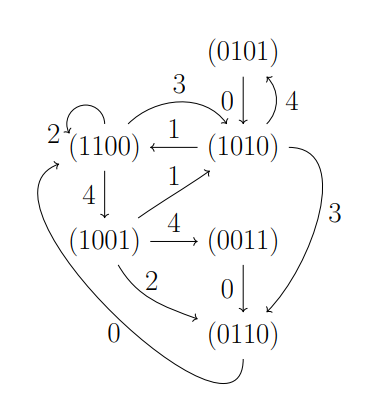
Learning to juggle through mathematics
CADS, Arley St, Highfield, Sheffield S2 4QP
2pm-4pm, Sunday 14th September
Tickets £8-£15
Lead by expert juggler Mees Jager, this workshop will explore the beauty to be found in understanding the mathematical system that lives behind juggling, and the possibilities for learning juggling itself.
When people learn how to juggle it is more often than not a pretty demotivating method. Just try hard and keep trying some more until it works. There are some exercises, but in the end the goal is to get 3 balls going and everything before that is simply not juggling. That is often the view people have of what it means to juggle, but Mees will share another way of approaching this!
Siteswap, the standard mathematical system for juggling, allows us to create lots of small exercises which are incredibly challenging but also highly adaptable to the level of the person who is learning to juggle. In a sense it gives a refinement in the whole learning process, providing lots of small stepping stones and with that, success moments, rather than these big jumps we would otherwise have to make in our learning experience.
Mees will share how understanding the theory, not to its core, but roughly the point of it, will be beneficial to anyone wanting to learn to juggle or who is already a juggler. You will get a better understanding of timing and rhythm of patterns, and it will give you a different tool with which you can evaluate the things that might be going wrong.
